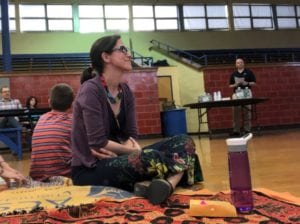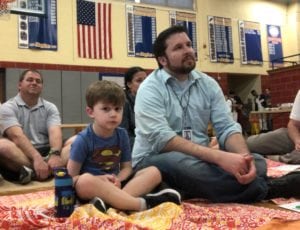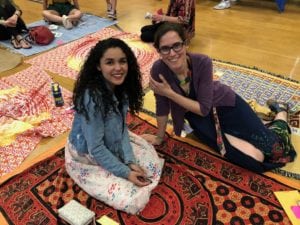Considering Eastern Christian School? Join us at an upcoming open house event or take a personal tour! Register Online
EC is Hungry for Change
Have you ever been in the position of eating a warm, filling meal while someone who was hungry, without access to food, watched you eat? This happened to some who were at Eastern Christian School’s Oxfam Hunger Banquet when dozens of family, staff, and community members came together to enjoy a meal. Some were, however, much more fortunate than others.
The premise behind the Oxfam Hunger Banquet is simple: come to a dinner to eat together. But it gets a little more interesting when guests realize they won’t all be sharing the same meal. They also won’t be eating at the same kind of table, and won’t be served in an equal manner, either. Guests at the banquet (myself included), drew cards upon arrival that separated them into 3 classes: upper, middle and lower. I was among the fifty percent of guests who represented the lowest class, and took my seat accordingly on the floor without a table or chairs, to await my dinner. Others were more fortunate. Thirty percent of guests represented the middle class and were seated at modest but comfortable picnic-style tables. The upper class, only twenty percent of guests, sat at a beautifully decorated table with a tablecloth, flowers, and comfortable chairs.
From here, we quickly began to feel the differences in the classes. When our meal was ‘served,’ I  scooped a modest portion of plain rice from a pot and sipped on tepid tap water. Our dishes weren’t pretty or special in any way, and there was nothing flavorful on them. With the exception of great company, the enjoyment of eating was absent as we ate tasteless rice with our fingers. I was thankful I wore comfortable clothes, as my back began to ache from sitting on the gym floor. We sat together, half the people in the room, and when our food was gone, our bellies still rumbled.
scooped a modest portion of plain rice from a pot and sipped on tepid tap water. Our dishes weren’t pretty or special in any way, and there was nothing flavorful on them. With the exception of great company, the enjoyment of eating was absent as we ate tasteless rice with our fingers. I was thankful I wore comfortable clothes, as my back began to ache from sitting on the gym floor. We sat together, half the people in the room, and when our food was gone, our bellies still rumbled.
At the middle-class table, things were a bit better, but still, not the standard most of us are used to. At modest tables with bench seating, guests were treated to a buffet of white rice and beans. It doesn’t seem like a big difference from the lower class’ meal. However, access to protein, even meatless, is a massive dietary benefit. And judging from how my back felt and how restless I was at the end of the evening, proper seating, even benches, is a huge benefit, as well!
While we were merely eating for survival, others around us were feasting. At the upper-class table, guests feasted on roast chicken and vegetables. They were served healthy servings of cheesy pasta and had a large assortment of beverages to choose from, including juice and soda. They ate until they were full, and still, there was plenty of food to share with others. Preschooler Joel Intlekofer left his place on the floor and brought his empty bowl to Dean of Students Phil Verrengia, and begged for some chicken. While against the rules of the hunger banquet, Mr. Verrengia couldn’t bear to tell him no, especially as they had plenty to spare!
What was learned at the banquet? Some of the biggest takeaways from the evening:
- We are members of our classes by chance, not by choice. For most of the world’s population, place of birth, parents, and other factors like weather, landscape, and government corruption determine your class. It’s difficult to climb the class ladder, so-to-speak, but easy in some places to slide down even lower.
- Most people in the world don’t have the luxury of being picky or selective with their food choices. For those of us who choose to be vegan, vegetarian, raw-foods-only, Whole 30, or whatever other ways we like to eat, for the majority of people, these are not options. You eat what you can access to stay alive.
- Some families have to prioritize who will eat and who will not. This was eye-opening for many of us. When food is scarce, who will eat the little that is available? The children who need nourishment to grow? The mother who is pregnant with another baby? The father who needs strength to go to work? Sadly, the question does exist, but it is a question that has no good answer.
Perhaps the biggest takeaway was that, by the world’s standards of income, a salary of a mere $8,400 a year places you in the top 20% of the richest people on the planet.
Again, we are reminded, as we often are in America, of our great responsibility to use the wealth God has trusted us with to answer the prayers of others. We are God’s hands and feet, and the Oxfam Hunger Banquet effectively demonstrated the great needs of the people of the world. Simple ways to meet these needs:
- Donate to your local food pantry

- Serve mails in a local soup kitchen
- Cook a meal for your neighbor
- Buy lunch for a person living on the street
- Volunteer with New York City Relief, or another organization fighting hunger in our area
If we all gave a little, it would go a long way.
Thanks to Micah Challenge Students and teachers, and everyone who supported this awesome event. I hope to attend next year, to take my place on the floor, and remember God’s call on my life to do what I learned in Kindergarten: simply, to share.





